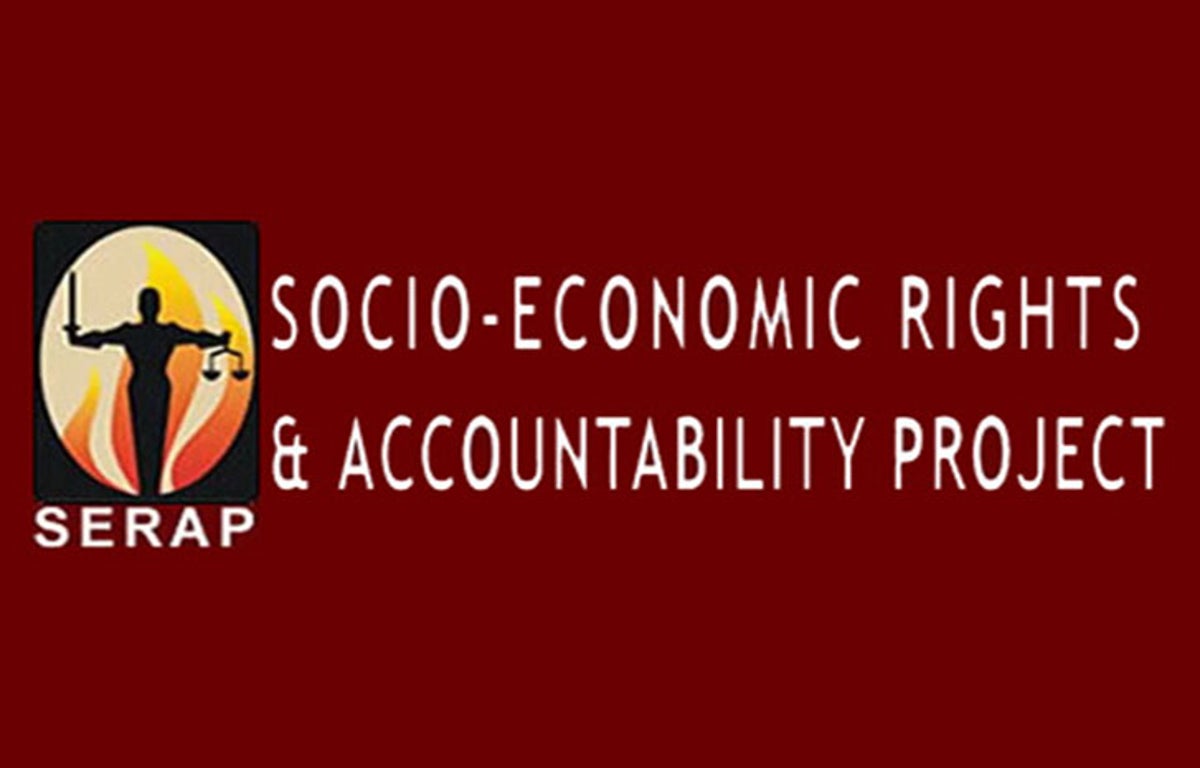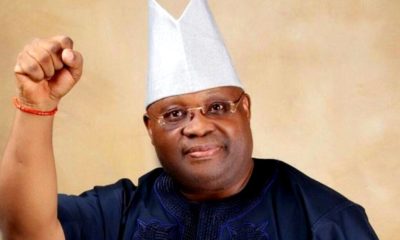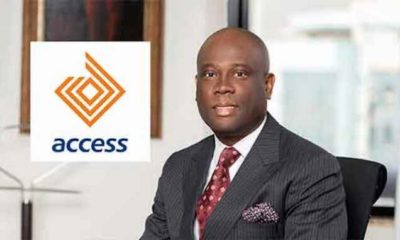NEWS
Senate Committee, NCDMB Hold Inaugural Meeting, To Collaborate On Local Content Implementation

The Senate Committee on Local Content on Wednesday held the first interactive session with the leadership of the Nigerian Content Development and Monitoring Board (NCDMB) at the Senate Building at Abuja and resolved to collaborate and deepen the implementation of local content in the oil and gas industry and linkage sectors.
The Chairman of the Committee, Senator Natasha Akpoti-Uduaghan moderated the meeting and assured that the committee would not antagonize the Board and other entities under its supervision but would collaborate towards effective implementation of the Board’s mandate for the benefit of Nigerians.
She expressed concern over the parlous state of the economy, particularly the alarming level of unemployment which has fuelled an increase in criminality.
She emphasised the need to deepen the implementation of the Nigerian Oil and Gas Industry Content Development (NOGICD Act, to create employment opportunities from the activities in the oil industry and catalyse other sectors of the economy.
She requested the Board to submits performance reports on the implementation of the NOGICD Act, specifically on the Board’s third-party investments, capacity building programmes, expatriate quota management and research and development.
She also requested the Board to recommend sections of the Nigerian Oil and Gas Industry Content Development (NOGICD) Act that needed to be amended by the National Assembly.
Other questions raised by the committee concerned the status of the Nigerian Content Development Fund (NCDF) and the performance of the Nigerian Content Intervention Fund (NCI Fund).
The Committee Chair criticised the international oil companies (IOCs) in Nigeria for not investing in the petrochemical sub-sector and other associated manufacturing activities, whereas IOCs in other oil producing jurisdictions make such investments and contribute significantly to those economies.
She announced that the committee would invite the IOCs and other relevant agencies of Government, with a view to compel the companies to create tangible value in the Nigerian economy beyond the extraction and sale of crude oil.
She said, “We need to get them around the table and tell them what we want as a country as against watching them export crude oil only.”
In his comments, the Executive Secretary NCDMB, Engr. Felix Omatsola Ogbe thanked the committee for adopting a cooperative approach and assured that the Board would provide all the requested documentations and partner effectively, to achieve the mandate of the committee and that of the Board.
On the Board’s performance, the Executive Secretary stated that the Nigerian Content level for 2022 and 2023 stood at 54 percent and the Board is on course to accomplish the 70 percent target for 2027, as set in the Nigerian Content roadmap.
On international oil companies’ model of operation in Nigeria, the Executive Secretary explained that most oil conglomerates have different arms, which includes the downstream companies which make such investments in the petrochemical and linkage sub-sectors.
He, however, noted that most operating companies in Nigeria do not have such subsidiaries in the country, hinting that the Board is willing to support indigenous firms that are interested in such ventures.
He added that the Board lacked the mandate to compel the IOCs to change their business model in Nigeria but was collaborating with some oil companies to develop the Nigerian Oil and Gas Parks Scheme (NOGaPs), which is designed to manufacture oil and gas equipment and components as well as other manufacturing and research and technology programmes.
The Director Finance and Personnel Management, NCDMB, Dr. Obinna Ofili provided clarity on the performance of the Nigerian Content Intervention Fund (NCI Fund) and the Nigerian Content Development Fund (NCDF).
He explained that the NCI Fund is managed by the Bank of Industry (BoI) on behalf of the Board, and US$300m was deposited with the BOI.
He clarified that the NCI Fund is a portion of the NCDF – which is pooled from the 1% percent of every contract awarded in the upstream sector of the Nigerian oil and gas industry, as specified in section 104 of the NOGICD Act.
He also revealed that BoI had loaned out US$330m to 70 qualified oil and gas companies, with the additional $30m accruing from the interests from the loans. He mentioned that another Fund created by the NCDMB is the US$50m domiciled with the Nigerian Export-Import Bank and it is broken into $30m for working capital and capacity building and $20m for Women in Oil and Gas.
Dr. Ofili indicated that eight firms have accessed the $30m working capital and capacity building fund, while three firms have successfully accessed the Women in oil and gas fund.
He said, “We want serious minded women entrepreneurs in the oil and gas industry to step forward and access this fund. That is the only way it can make impact in the economy.”
The Director asserted that the NCI Fund is the most successful fund scheme in the country, basing his assessment on the faithful repairment by the beneficiaries and the growth of the fund.
He mentioned that the Bank of Industry carries out quarterly project monitoring on the loan beneficiaries, while the NCDMB holds an annual monitoring review on the fund scheme and beneficiaries.
On the proposed amendment of the NOGICD Act, the Director Monitoring and Evaluation, Mr. Abdulmalik Halilu explained that concerted efforts were made during the tenure of the 9th National Assembly to review the legislation and the Board developed a compendium on areas that it believed should be amended. He promised that the Board would submit the compendium to the Senate so it could become the reference point for further discussions and considerations.
NEWS
SERAP Sues 36 Govs, Wike Over Trillions Of FAAC Allocations

The Socio-Economic Rights and Accountability Project (SERAP) has filed a lawsuit against the governors of Nigeria’s 36 states and the Minister of the Federal Capital Territory, Abuja, Nyesom Wike over failure to account for Federal allocations dating back to 1999.
It was gathered that action followed reports that the Federation Account Allocation Committee (FAAC) disbursed N1.123 trillion to the federal, state, and local governments for March 2024.
They shared N1.208 trillion in April, which saw the states collect N398.689 billion in March, after they collected N403.403 billion in April.
In the suit number FHC/ABJ/CS/666/2024 filed last Friday at the Federal High Court, Abuja, the SERAP is asking the court to “direct and compel the governors and Mr Wike to publish spending details of the FAAC allocations collected by their states and the FCT since 1999 including the list and locations of projects executed with the money.”
The SERAP also asked the court to “compel the governors and Mr Wike to invite the Economic and Financial Crimes Commission [EFCC] and the Independent Corrupt Practices and Other Related Offences Commission [ICPC] to probe any allegations of corruption linked to the allocations and to monitor how the money is spent.”
In the suit, the SERAP argued that, “Nigerians ought to know in what manner public funds including FAAC allocations, are spent by the governors and FCT minister.”
According to the SERAP, “Opacity in the spending of the FAAC allocations collected by the governors and Mr Wike would continue to have negative impacts on the fundamental interests of the citizens.”
According to the SERAP, “trillions of FAAC allocations received by Nigeria’s 36 states and the FCT have allegedly gone down the drain. The resulting human costs directly threaten the human rights of socially and economically vulnerable Nigerians.
“Without the information on the spending details of the FAAC allocations, Nigerians cannot follow the actions of their states and the FCT and they cannot properly fulfill their responsibilities as citizens.
“Directing and compelling the governors and FCT minister to provide the information sought and widely publish the spending details of the FAAC allocations collected by them would serve legitimate public interests.
“The failure by the governors and the FCT ministers to account for the spending of the FAAC allocations collected by them is entirely inconsistent and incompatible with the Nigerian Constitution 1999 [as amended] and the country’s international anti-corruption obligations.”
The suit filed on behalf of the SERAP by its lawyers Kolawole Oluwadare, Kehinde Oyewumi and Andrew Nwankwo.
No date has been fixed for the hearing of the suit.
NEWS
Former Labour Minister Passes Away
Prince Ajibola Afonja, a former Minister of Labour and Productivity under the Interim National Government, has passed away.
He died on Sunday night at the University College Hospital (UCH) in Ibadan, Oyo State, at the age of 82.
Afonja served as a minister during the brief administration of Chief Ernest Shonekan.
He was also a former Chairman of First Bank and a notable industrialist in his Oyo community, where he was recognized for his company, Integrated Dimensional Systems (IDS).
Afonja sustained injuries from a single-vehicle accident in Ilora, near his country home, and was subsequently taken to UCH in Ibadan for treatment, where he passed away.
Prince Ajibola Afonja, who passed away on Sunday night, was a beloved figure in his hometown, known for his dedication to the peace and development of Oyo.
He was a former senatorial candidate for the Oyo Central Senatorial District under the All Nigeria Peoples Party (ANPP).
The Oyo Global Forum (OGF), a prominent community-interest group, through its chairman, Taiwo Adebayo, confirmed the former minister’s passing in a late Sunday statement.
Adebayo described the late Afonja as a unifier.
The statement reads “On this dark day in Oyo, we mourn the loss of Prince Ajibola Afonja, former Labour Minister and Chairman of First Bank Nigeria, who passed away on Sunday night, aged 82.
“Although a national figure with tremendous influence, he was particularly light for the Oyo community where he made pioneering efforts as an industrialist. His legacy of generosity and open-heartedness touched countless lives, and his presence will be profoundly missed.
“Until his last month, Daddy IDS, as he was affectionately known, as a reference to his manufacturing company, remained hardworking, dedicated to realising one of the most transformative business visions for the country’s economy. It was the E-Customs project,”
“For all of us that he inspired, we shall honor his memory by carrying forward the values he embodied and continuing his legacy of service and compassion, the values that guide OGF, which he supported during his lifetime.” It added
He added that his absence leaves a void that will be difficult to fill, but noted that his spirit of generosity and leadership will continue to inspire the community.
The OGF leader extended the group’s deepest condolences to the deceased’s family, the entire Oyo community, and his friends and associates during this mourning period.
International News
Iran’s President, 8 High-Ranking Officials Dies In Helicopter Crash
Iran experienced a tragic event as President Ebrahim Raisi, aged 63, lost his life in a helicopter crash.
Search and rescue teams found the wreckage on Monday, revealing that the helicopter was carrying President Raisi, alongside Foreign Minister Hossein Amirabdollahian and seven other high-ranking officials.
The announcement of President Raisi’s passing was made early Monday morning.
The crash occurred in the rugged mountainous terrain of Iran’s northwest region.
This devastating event comes amid heightened tensions following Iran’s retaliatory drone-and-missile strike on Israel, sparked by an earlier attack on its diplomatic compound in Damascus.
BIZTELLERS reports that Iran faced a wave of uncertainty on Sunday as search and rescue teams navigated through fog-covered mountain terrain in the aftermath of President Ebrahim Raisi’s helicopter disappearance, which state media labeled as an “accident.”
However, concern escalated for the 63-year-old ultraconservative leader as communication with the aircraft, transporting him alongside Foreign Minister Hossein Amir-Abdollahian and other officials in East Azerbaijan province, was lost, according to reports.
Ebrahim Raisi, known for his hardline stance, clinched the presidency in a notably uncompetitive 2021 election.
As the former chief justice, he oversaw a crackdown on dissent during a turbulent period of youth-led protests against clerical authority.
Positioned as the second-most powerful figure in Iran’s political landscape, after Supreme Leader Ayatollah Ali Khomeini, Raisi’s authority was substantial.
According to Iran’s Constitution, in the event of the president’s demise, the first vice president assumes office pending approval from the Supreme Leader.


















